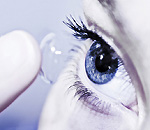First human trial of antibacterial contact lens

The ASX-listed company commercialises a novel anti-bacterial technology identified by UNSW researchers at the Centre for Marine Biofouling and Bioinnovation.
The trial beginning on June 29 will compare the safety performance of an antibacterial contact lens to that of a standard contact lens.
The comparison involving ten people will evaluate eye health, lens performance on the eye and wearers’ subjective responses. Biosignal will announce the trial’s results to the market in July.
“Adverse events caused by microbial contamination of contact lenses are a major impediment to more convenient, extended wear of contact lenses,” says UNSW Professor Mark Willcox, who will supervise the trial. “This trial is the first significant step towards overcoming this significant problem.”
Acute red eye occurs in 20 percent per year of the estimated 100 million wearers of contact lenses worldwide. Microbial keratitis, a serous eye disease that can cause blindness, occurs in one in 500 contact lens wearers per year if they sleep in lenses. There is currently no antibacterial contact lens in the market.
Biosignal’s technology prevents and disrupts microbial infection by “jamming” the signalling systems bacteria rely on to form biofilms. Because the technology does not kill bacteria, Biosignal’s technology is less likely to create the drug-resistance problems that plague current anti-microbial treatments. The US Centers for Disease Control estimate that biofilms account for at least two-thirds of all chronic bacterial infections.
Biosignal and the Institute for Eye Research have tested antibiofilm compounds and generated proof of concept data in a broad range of product categories in the medical, industrial and consumer fields.
UNSW Media contacts: Dan Gaffney, mob 0411 156 015, or Mark Willcox, ph 9385 7412.
Media Contact
More Information:
http://www.unsw.edu.auAll latest news from the category: Life Sciences and Chemistry
Articles and reports from the Life Sciences and chemistry area deal with applied and basic research into modern biology, chemistry and human medicine.
Valuable information can be found on a range of life sciences fields including bacteriology, biochemistry, bionics, bioinformatics, biophysics, biotechnology, genetics, geobotany, human biology, marine biology, microbiology, molecular biology, cellular biology, zoology, bioinorganic chemistry, microchemistry and environmental chemistry.
Newest articles

Properties of new materials for microchips
… can now be measured well. Reseachers of Delft University of Technology demonstrated measuring performance properties of ultrathin silicon membranes. Making ever smaller and more powerful chips requires new ultrathin…

Floating solar’s potential
… to support sustainable development by addressing climate, water, and energy goals holistically. A new study published this week in Nature Energy raises the potential for floating solar photovoltaics (FPV)…

Skyrmions move at record speeds
… a step towards the computing of the future. An international research team led by scientists from the CNRS1 has discovered that the magnetic nanobubbles2 known as skyrmions can be…





















